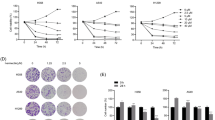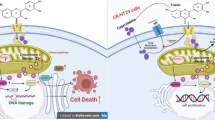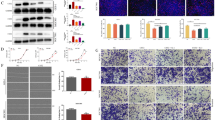Abstract
Klotho is an anti-aging, anti-inflammator, and anti-oxidative protein and has been shown to important role in tumorigenesis, proliferation, survival, autophagy, and resistance to tumor suppressor effects in several types of human cancers. In this study, we aimed to investigate possible anti-tümör and apoptotic effects of exogen klotho in human colorectal adenocarcinoma cells (HT-29) and healthy colon cells (CCD 841 CoN). The WST-8 test was used to determine the half-maximum inhibitory concentration (IC50) of the klotho protein. AO-PI fluorescent staining techniques and Annexin V-PI flow cytometry was utilized to observe and detect the apoptosis of cancer cells induced by klotho. Our results demonstrated that klotho had a cytotoxic effect against colorectal adenocarcinoma cells in a dose-dependent manner. Our Annexin V-PI flow cytometric and AO-PI fluorescent analyses showed that klotho induced quantitative and morphological changes that indicate apoptotic induction in the human colorectal adenocarcinoma. This study results proved for the first time that klotho may be an effective potential therapeutic agent that may be used in adjuvant therapy in human colorectal adenocarcinoma it does not affect selectively healthy colon cells and but leading cancer cells to apoptosis.





Similar content being viewed by others
References
Li X-X, Huang L-Y, Peng J-J, et al. Klotho suppresses growth and invasion of colon cancer cells through inhibition of IGF1R-mediated PI3K/AKT pathway. Int J Oncol. 2014;45:611–8.
Zhou X, Wang X. Klotho: a novel biomarker for cancer. J Cancer Res Clin Oncol. 2015;141:961–9.
Pan J, Zhong J, Gan LH, et al. Klotho, an anti-senescence related gene, is frequently inactivated through promoter hypermethylation in colorectal cancer. Tumor Biology. 2011;32:729–35.
Kuro-o M, Matsumura Y, Aizawa H, et al. Mutation of the mouse klotho gene leads to a syndrome resembling ageing. Nature. 1997;390:45–51.
Kuro-o M. Molecular mechanisms underlying accelerated aging by defects in the FGF23-klotho system. Int J Nephrol. 2018;2018:1–6.
Kurosu H, Yamamoto M, Clark JD, et al. Suppression of aging in mice by the hormone klotho. Science. 2005;309:1829–33.
Yamamoto M, Clark JD, Pastor JV, et al. Regulation of oxidative stress by the anti-aging hormone klotho. J Biol Chem. 2005;280:38029–34.
Chen B, Wang X, Zhao W, et al. Klotho inhibits growth and promotes apoptosis in human lung cancer cell line A549. J Exp Clin Cancer Res. 2010;29:1–7.
Xu Y, Sun Z. Molecular basis of klotho: from gene to function in aging. Endocr Rev. 2015;36:174–93.
Kharitonenkov A, Shiyanova TL, Koester A, et al. FGF-21 as a novel metabolic regulator. J Clin Investig. 2005;115:1627–35.
Yahata K, Mori K, Arai H, et al. Molecular cloning and expression of a novel klotho-related protein. J Mol Med. 2000;78:389–94.
Siahanidou T, Garatzioti M, Lazaropoulou C, et al. Plasma soluble α-klotho protein levels in premature and term neonates: correlations with growth and metabolic parameters. Eur J Endocrinol. 2012;167:433.
Stoddart MJ. WST-8 analysis of cell viability during osteogenesis of human mesenchymal stem cells. In: Mammalian cell viability. New Jersey: Springer; 2011. p. 21–5.
Chen C-D, Li H, Liang J, et al. The anti-aging and tumor suppressor protein klotho enhances differentiation of a human oligodendrocytic hybrid cell line. J Mol Neurosci. 2015;55:76–90.
Sun H, Gao Y, Lu K, et al. Overexpression of klotho suppresses liver cancer progression and induces cell apoptosis by negatively regulating wnt/β-catenin signaling pathway. World J Surg Oncol. 2015;13:1–8.
Tang X, Wang Y, Fan Z, et al. Klotho: a tumor suppressor and modulator of the Wnt/β-catenin pathway in human hepatocellular carcinoma. Lab Invest. 2016;96:197–205.
Zhou X, Fang X, Jiang Y, et al. Klotho, an anti-aging gene, acts as a tumor suppressor and inhibitor of IGF-1R signaling in diffuse large B cell lymphoma. J Hematol Oncol. 2017;10:1–11.
Matsumura Y, Aizawa H, Shiraki-Iida T, et al. Identification of the humanklothogene and its two transcripts encoding membrane and secretedklothoprotein. Biochem Biophys Res Commun. 1998;242:626–30.
Kuro-o M. Klotho. Pflügers Arch Eur J Physiol. 2010;459:333–43. https://doi.org/10.1007/s00424-009-0722-7.
Lee J, Jeong D-J, Kim J, et al. The anti-aging gene klotho is a novel target for epigenetic silencing in human cervical carcinoma. Mol Cancer. 2010;9:1–10.
Wang L, Wang X, Wang X, et al. Klotho is silenced through promoter hypermethylation in gastric cancer. Am J Cancer Res. 2011;1:111.
Shu G, Xie B, Ren F, et al. Restoration of klotho expression induces apoptosis and autophagy in hepatocellular carcinoma cells. Cell Oncol. 2013;36:121–9.
Rubinek T, Shulman M, Israeli S, et al. Epigenetic silencing of the tumor suppressor klotho in human breast cancer. Breast Cancer Res Treat. 2012;133:649–57.
Wolf I, Levanon-Cohen S, Bose S, et al. Klotho: a tumor suppressor and a modulator of the IGF-1 and FGF pathways in human breast cancer. Oncogene. 2008;27:7094–105.
Behera R, Kaur A, Webster MR, et al. Inhibition of age-related therapy resistance in melanoma by rosiglitazone-mediated induction of klotho. Clin Cancer Res. 2017;23:3181–90.
Rubinstein TA, Shahmoon S, Zigmond E, et al. Klotho suppresses colorectal cancer through modulation of the unfolded protein response. Oncogene. 2019;38:794–807.
Baskić D, Popović S, Ristić P, et al. Analysis of cycloheximide-induced apoptosis in human leukocytes: fluorescence microscopy using annexin V/propidium iodide versus acridin orange/ethidium bromide. Cell Biol Int. 2006;30:924–32.
Gunes S, Soykan MN, Sariboyaci AE, Uysal O, Sevimli TS. Enhancement of Apo2L/TRAIL signaling pathway receptors by the activation of klotho gene with CRISPR/Cas9 in Caco-2 colon cancer cells. Med Oncol. 2021;38:146.
Acknowledgements
We thank to Mehtap Kutlu and Alper Tunga Ozdemir for the donation of cell lines.
Funding
This study was supported by grants Eskişehir Osmangazi University, Scientific Research Projects (ESOGU-BAP, ESTEM Code: 202046A113).
Author information
Authors and Affiliations
Contributions
AES is the main author in this study and contributed to the study conception and design. Material preparation, data collection, and analysis were performed by SG and MNS. The first draft of the manuscript was written by OU. All authors commented on previous versions of the manuscript. Corresponding author read and approved the final manuscript.
Corresponding author
Ethics declarations
Conflict of interest
The authors report no conflicts of interest. The authors alone are responsible for the content and writing of the paper.
Ethical approval
This study is not approval required for the ethics committee.
Additional information
Publisher's Note
Springer Nature remains neutral with regard to jurisdictional claims in published maps and institutional affiliations.
Rights and permissions
About this article
Cite this article
Sariboyaci, A.E., Uysal, O., Soykan, M.N. et al. The potential therapeutic effect of klotho on cell viability in human colorectal adenocarcinoma HT-29 cells. Med Oncol 39, 191 (2022). https://doi.org/10.1007/s12032-022-01793-x
Received:
Accepted:
Published:
DOI: https://doi.org/10.1007/s12032-022-01793-x




